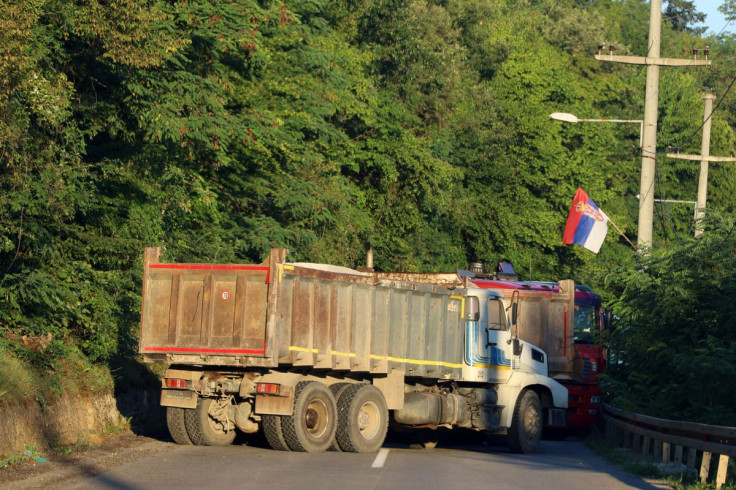Serbia-Kosovo War Next? Tension Between Two Nations Builds Up
KEY POINTS
- Kosovo's government announced rules requiring ethnic Serbs to apply for Kosovar license plates
- Some unknown Serbian demonstrators fired at Kosovar police officers
- Russia blamed 'radical' Kosovo for displacing Serbs living in the country
Tensions between Serbia and Kosovo are building up after a dispute over license plates between the Balkan nations, prompting fears that the violence could escalate further.
Kosovo is a small Balkan country bordering Albania, North Macedonia, Montenegro and Serbia. While many Serbs consider the Balkan country the birthplace of their nation, only 6% of Kosovo's population is Serbian. At least 92% are Albanian, while the rest are Bosniaks, Gorans, Turks and Roma.
Kosovo’s government had previously announced regulations that required ethnic Serbs living in villages in northern Kosovo to apply for Kosovar license plates. The Kosovar government also imposed another regulation that forced Serbians entering Kosovo to get additional entry-exit documents from Kosovar authorities at the border. Previously, Serbs could enter Kosovo without the documents.
In response, Serbian demonstrators on Sunday night built barricades along the northern border. Unknown gunmen also fired at Kosovo police officers, forcing Kosovar authorities to close the border crossings.
“The following hours, days and weeks may be challenging and problematic,” Kosovo Prime Minister Albin Kurti said in a video posted on his social media channels following the shooting.
192K views, 19K likes, 1.4K loves, 1.9K comments, 1K shares, Facebook Watch Videos from Albin Kurti: Të dashur qytetarë të Republikës së Kosovës,Ende pa filluar lëshimi ynë i dokumenteve të...
Serbia had put its army on high alert after the shooting. Russia also accused “radical” Kosovo of attempting to displace Serbs living in the northern areas of the Balkan country with the new border rules.
“Kosovar leaders know that Serbs will not be indifferent to a direct attack on their freedoms, and they are deliberately aggravating it in order to launch a violent scenario,” Maria Zakharova, spokeswoman for Russia’s Foreign Ministry, said.
The Kosovar government later announced that the regulations, which were set to take effect on Aug. 1, will be postponed until Sept. 1 as long as the demonstrators remove all barricades at the border and complete freedom of movement is restored.
Tensions between the Balkan countries began when Kosovo first sought its independence in the 1990s after the breakup of Yugoslavia. In response, Serbia launched a crackdown against ethnic Albanians seeking independence. The conflict ended in 1999 when NATO carried out a bombing campaign targeting Serbian military positions in Kosovo. The bombing forced Serbian troops to withdraw from Kosovo, with Serbian President Aleksander Vucic vowing that they would never recognize Kosovo as an independent state.
Kosovo unilaterally declared independence in 2008. Currently, more than 100 countries recognize Kosovo as an independent state, including the U.S. and the U.K. However, China, Serbia and Russia do not recognize Kosovo’s independence, according to the World Population Review.
Kosovo previously said that Serbia was stirring up ethnic tensions and accused Russia of supporting the latter. Serbia is one of the few countries that refused to condemn Russia for invading Ukraine in February. Instead, Vucic signed a “favorable gas deal” with Russia.

© Copyright IBTimes 2024. All rights reserved.






















